Take back your patio, deck, and yard with mosquito repellents to keep these pests away.
BobVila.com and its partners may earn a commission if you purchase a product through one of our links.
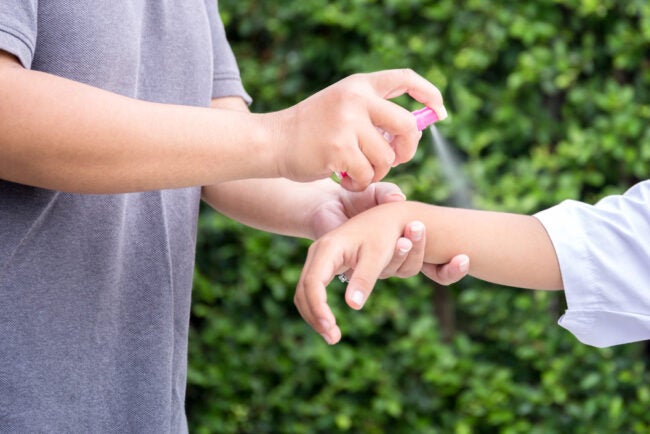
Photo: depositphotos.com
Mosquitoes are among the most annoying pests that you must deal with when doing any activity that puts you outside during warm weather. Their saw-like bites hurt initially, itch constantly, and can lead to serious diseases, like malaria, West Nile virus, and dengue fever.
To help prevent mosquito bites and repel these irritating nuisances you need an effective repellent. The best mosquito repellent for you can come in many different forms, like lotion, wipes, spray, or even technology that is designed to repel mosquitoes from a given area, instead of applying repellent to your body. You also can choose all-natural and child-safe mosquito repellents. Options that are a combination sunscreen and repellent are available to keep your skin safe from harmful UV rays and insect bites and stings. The products below consider these and other factors when recommending mosquito repellent according to type, efficacy, and overall quality.
- BEST OVERALL: Ben’s 100 Insect Repellent Pump
- BEST BANG FOR THE BUCK: OFF! Deep Woods Insect & Mosquito Repellent
- BEST NATURAL: Murphy’s Naturals Mosquito Repellent Balm
- BEST LOTION: Avon SKIN-SO-SOFT Bug Guard PLUS Insect Repellent
- BEST WIPES: Repel 94100 Insect Repellent Mosquito Wipes, 30% DEET
- BEST SPRAY: Repel HG-94108 100 Insect Repellent Pump Spray
- BEST TECH: Thermacell MR300 Portable Mosquito Repeller
- BEST FOR KIDS: California Baby Plant-Based Natural Bug Repellent

Photo: depositphotos.com
What to Look for When Buying Mosquito Repellent
Before buying a new mosquito repellent, keep in mind these important considerations so that you get the right product for your family and circumstances.
Type
Mosquito repellent comes in many types that are separated primarily by ingredients, application method, and safety considerations. These types include natural, chemical, and technological.
- Natural mosquito repellent uses mostly essential oils from plants that create an odor that naturally repels insects. These scents commonly include rosemary, lemongrass, sage, citronella, peppermint, basil, lemon balm, and garlic, plus other possible ingredients. Natural repellents are great for kids and people with skin sensitivities, but they don’t have the same staying power or effectiveness of the chemically-based options.
- Chemical mosquito repellents rely on strong chemicals such as DEET, picaridin, permethrin, and IR3535 to conceal the scent of your blood from mosquitoes. These chemical repellents work the best, but they also are the most dangerous. The composition of these repellents can be damaging if inhaled, ingested, or even if they are absorbed through the skin in large enough quantities. Always read and follow the manufacturer’s recommendations for use and never use these products on children.
- Technological mosquito repellents are not applied in a lotion, balm, wipe, or spray format. In fact, these repellents do not go on your body. Instead, these alternative products use repellent smells, either chemical or natural, to ward off insects from a given location. These devices can be stationary or portable so you can set up a barrier on your back deck, or go hiking with one of these tech repellents attached to your bag for ongoing protection. While tech mosquito repellents don’t work quite as well as chemical mosquito repellents, they have the advantage of not needing to apply repellent to your skin or clothes.
Ingredients
Mosquito repellent ingredients can be split into five major groups including essential oils, picaridin, DEET, permethrin, and IR3535.
- Essential oils are natural and have plant-based origins. Natural mosquito repellents often include citronella, rosemary, lemongrass, and peppermint, but there is a wide variety of effective essential oils that can be used in mosquito repellents. While these ingredients are not as effective as DEET or picaridin, they are less dangerous to the person who is using them. However, some essential oils—in large enough quantities—still can be dangerous if ingested, inhaled, or applied to the skin. Some people might also be allergic to one or more of these essential oils, so be sure to check the warnings and directions on the packaging before use.
- Picaridin and DEET are the most commonly used chemical repellents, but picaridin is more popular across the international community. This chemical is a comparable alternative to DEET in just about every category and even seems to last for a longer time. It isn’t as toxic to marine life as DEET, but it is still considered moderately toxic by the EPA, CDC, and WHO, so use repellents with picaridin with caution and never in excess.
- DEET was developed by the U.S. Army to protect soldiers from tropical insects and has been the most popular mosquito repellent in America since 1957. It is highly effective at warding off mosquitos, ticks, and other insects, but DEET is highly toxic to aquatic creatures. Although DEET is the most effective chemical ingredient available, it isn’t advisable for children and it can even be harmful to adults. Always follow the manufacturer’s recommendations for use and application to avoid harmful effects from ingestion, absorption, or inhalation.
- Permethrin is the least toxic of all the chemically based repellent ingredients, but it wears off very quickly when applied directly to your skin. Instead, apply permethrin to your clothing, where it provides long-lasting, odorless protection for weeks, even after your clothing has been through several wash cycles. This makes it ideal for individuals who require the element of stealth while they are outside, like hunters, anglers, and wildlife photographers.
- IR3535 stands for Insect Repellent 3535. It was introduced to the market in 1999 as an alternative to picaridin and DEET, but IR3535 isn’t as effective as the two reigning repellent champs. Repellents using IR3535 are typically good for mosquitoes and can be used as a moderate tick repellent, but this is the weakest of the four chemically-based repellent ingredients.
Longevity
The length of time that a product will remain working as an effective repellent differs greatly between individuals sprays, lotions, wipes, or balms. Even a product made by the same company and using the same ingredients can vary in the amount of time before you need to reapply the repellent because the amount of the active ingredient also varies.
If at all possible, find a mosquito repellent that will keep you protected with only one application for the entire time that you are outside to reduce the amount of repellent you need to apply to your skin or clothes. Mosquito repellents should always indicate their longevity and directions for reapplication. If a product does not display this information, check the manufacturer’s website or consider a different repellent.
Ease of Use
When DEET was introduced to the market as an insect repellent, it was offered in a cream, lotion, or powder. However, aerosol sprays soon became the most commonly used method of application. Now you can choose between wipes, lotions/balms, sprays, or even just setting up a piece of technology to fend off the pests for you.
- Wipes are easy to use. Just rub the repellent from the wipe onto your skin as indicated by the directions.
- Lotions and balms are more difficult to use than either wipes or sprays, but they still aren’t that complicated. Lotion or balm can be rubbed into your skin just like sunscreen. These lotions and balms might even come in a formula that includes a sunscreen to give you protection from mosquitoes and the sun in one helpful product.
- Sprays are the most commonly used form of repellent application. They are not as easy to use as wipes, but the spray function is relatively simple to understand. Cover your eyes and mouth, then spray away, ensuring that you properly apply the repellent to any exposed areas. There might be some debate about whether sprays are easier than lotions because of the higher risk of ingesting sprays, but most people still prefer a quick spray cloud to the messy rub-in lotions.
- Technological repellents are the most difficult to use. They often require an initial setup before you can activate them and you might have to try a few times before you get the desired coverage. The overall effectiveness of these products is based on several factors such as placement, wind carry of the repellent, ingredients used, and whether the device has sufficient power to operate.
Our Top Picks
These product recommendations were evaluated based on quality, price, type, and effectiveness to help you find the best mosquito repellent to help you take back your yard.
Best Overall
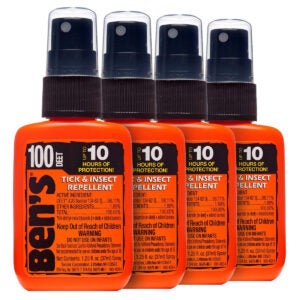
If you want an effective mosquito repellent for hunting, fishing, or tracking through the heaviest mosquito-infested locations, then check out Ben’s 100 Insect Repellent. This chemical-based repellent has a fragrance-free formula so that you won’t have to worry about your mosquito protection warding away fish or game animals. Each spray-pump bottle comes with a cap and is small enough to fit in your pocket or pack so you can carry it along outside. It comes in this 4-pack of 1.25-ounce bottles small enough for air travel, and in larger sizes.
This repellent was the first 100 percent DEET product in America to be registered with the EPA and continues to be made with a 100 percent DEET formula to repel mosquitos, ticks, and other biting insects for more than 10 hours of protection. Application is easy with the spray pump bottle format, but be sure to follow the manufacturer’s directions and avoid overapplying the spray because the strong formula can be harmful.
Best Bang For the Buck
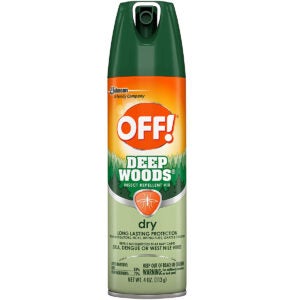
To get the mosquito protection you need while also protecting your budget, consider the OFF! Deep Woods Insect & Mosquito Repellent. This product comes with two aerosol spray bottles that make application easy. To use, simply depress the button on the top and spray the chemical repellent from the front of the bottle to the desired areas, following the manufacturer’s directions and recommendations for application.
This repellent contains 25 percent DEET and it can provide protection against mosquitoes, ticks, biting flies, gnats, and chiggers for up to 8 hours. The spray-on formula dries quickly and doesn’t leave an oily or greasy residue. However, aerosol cans can be dangerous in high temperatures, so be sure to keep this repellent away from heat sources and open flames.
BEST NATURAL
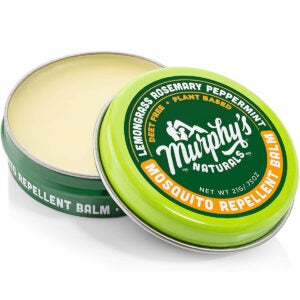
DEET, picaridin, and IR3535 might repel mosquitoes, but Murphy’s Naturals Mosquito Repellent Balm can get the job done without exposing you to harmful chemicals. The essential oils in this natural mosquito repellent, including lemongrass, rosemary, cedarwood, and peppermint, provide protection for up to 8 hours on average. They also smell mild and good, instead of the chemical odor you get from some chemically based repellents.
This repellent balm is easy to apply and doesn’t leave a greasy residue on your skin. Just take a small amount of balm and rub it into your skin in the desired locations. However, do not apply the balm around your eyes, mouth, or nose because the essential oils are strong enough to cause discomfort, mild burning, and difficulty breathing. Carry the small tin of repellent balm in your pocket or bag so that you are always protected.
BEST LOTION
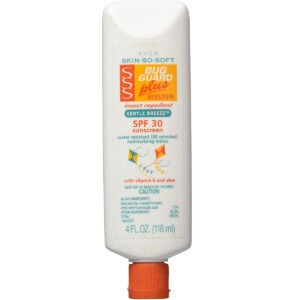
Designed to be used by almost the entire family, including children above the age of 6 months, Avon SKIN-SO-SOFT Bug Guard PLUS Insect Repellent comes in a lotion form that should be applied directly to your skin liberally, as though you were rubbing in regular sunscreen. The directions indicate that it takes about 15 minutes to absorb fully and thus, begin working.
The SPF 30 sunscreen in the lotion is water-resistant but should be reapplied every 2 hours or sooner if you have been swimming or sweating for more than 80 minutes. The mosquito repellent portion of the formula uses 7.5 percent IR3535 to repel mosquitoes for up to 2 hours before needing to be reapplied. However, you should not exceed more than nine applications in a day.
BEST WIPES
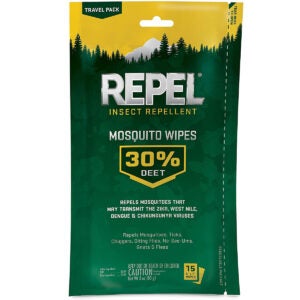
If you are boarding a plane and don’t want to deal with the hassle of carrying a travel-size spray bottle or aerosol can, Repel Mosquito Repellent Wipes are a handy and effective alternative that still gives you long-lasting mosquito protection. Each wipe measures 5 inches by 7 inches and contains 30 percent DEET to repel mosquitoes, ticks, chiggers, biting flies, gnats, and fleas for up to 8 hours of protection.
The travel-size package comes with 15 wipes that are easy to apply to the desired areas. To use, simply rub the repellent from the wipe onto your skin. The package is also resealable so you can close it up and return it to your bag or backpack when you are done without worrying about the wipes losing their effectiveness.
BEST SPRAY
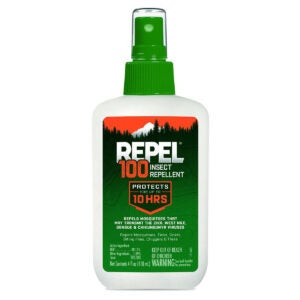
If you prefer the convenience of a spray, the Repel HG-94108 100 Insect Repellent Spray goes on easily and lasts all day. Just depress the pump and spray all exposed areas according to the manufacturer’s directions. After applying, put the 4-ounce spray pump bottle’s included plastic lid back on to safely store the repellent in your bag or pack until you need it again.
This repellent is intended for use in heavily-infested locations, like deep woods or marshes, where mosquitoes are likely to nest and feed. It uses a 98.11 percent DEET formula to provide up to 10 hours of protection from mosquitoes, ticks, gnats, biting flies, chiggers, and fleas. However, you should avoid overapplication and you should not use this product on children.
BEST TECH
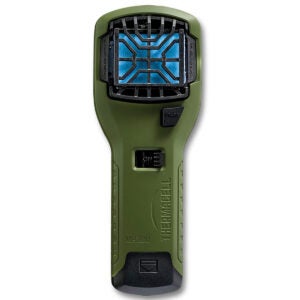
If you don’t want to put sprays, lotions, balms, wipes, or any other repellent on your skin or clothes, then a technological tool like the Thermacell MR300 Portable Mosquito Repeller is your answer to a mosquito-free outdoors. The mosquito repeller comes with a fuel cartridge and three mosquito repellent mats. The active ingredient used in the mosquito repellent mats is d-allethrin, which is a synthetic pyrethroid based on the insecticidal effects of pyrethrum, which is found in chrysanthemum flowers.
To use, you must insert the included fuel cartridge and one mosquito repellent mat into the repeller. A switch at the front of the repeller turns on the heat source, which heats up the mosquito repellent mat, releasing repellent into the air. This creates a scent-free 15-foot protection area for up to 12 hours without leaving behind a residue. When one mat has been used up, switch it out for a new one. You can purchase a package of replacement mats without buying a new repeller.
BEST FOR KIDS
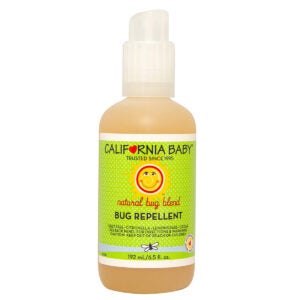
When taking the kids camping or just making sure that they have mosquito protection while outside, California Baby Plant-Based Mosquito Repellent is safe for use on kids older than 6 months. The plant-based formula contains essential oils, including lemongrass, cedar, and citronella, which parents can easily apply directly to kids’ exposed skin and external clothing.
The natural spray repellent is absorbed quickly into the skin so you don’t have to wait for it to begin working. It repels mosquitoes, biting flies, ticks, and fleas for up to 2 hours before needing to reapply it, with the manufacturer recommending frequent and liberal application. The formula has been allergy-tested and it is gluten-free, soy-free, oat-free, dairy-free, and nut-free, with the exception of coconut.
FAQs About Your New Mosquito Repellent
Take a look below to find the answers to a few of the most commonly asked questions about mosquito repellent.
Q. How do mosquito repellents work?
Mosquitoes use their sense of smell to find a readily available source of blood. Repellents are designed to go on the skin, where they evaporate and block this sense of smell, rendering you somewhat invisible to the mosquitoes. Although they still might happen upon you as they fly through the air, they cannot actively track you by the smell of your blood.
Q. How often should you reapply a repellent?
Depending on the type of repellent you use, you should reapply repellent every 2 to 10 hours. However, you should always refer to the manufacturer’s recommendations and the directions for use located on the can or bottle of repellent.
Q. What clothes help protect from mosquito bites?
Tightly-woven fabrics, like those used for high-quality athletic gear, help to block mosquitoes from reaching your skin. You can also wear a long-sleeve shirt and long pants, though cotton and linen are not as effective as polyester, nylon, and rayon.
tinyurlis.gdv.gdv.htu.nuclck.ruulvis.netshrtco.detny.im
مقالات مشابه
- تجهیزات و ابزارهای آزمایشگاهی شیشه آلات آزمایشگاهی
- شرکت صادرات و واردات کالاهای مختلف از جمله کاشی و سرامیک و ارائه دهنده خدمات ترانزیت و بارگیری دریایی و ریلی و ترخیص کالا برای کشورهای مختلف از جمله روسیه و کشورهای حوزه cis و سایر نقاط جهان - بازرگانی علی قانعی
- 3 نمونه از روش درمان خانگی عفونت واژن که باید بدانید
- شرکت صادرات و واردات کالاهای مختلف از جمله کاشی و سرامیک و ارائه دهنده خدمات ترانزیت و بارگیری دریایی و ریلی و ترخیص کالا برای کشورهای مختلف از جمله روسیه و کشورهای حوزه cis و سایر نقاط جهان - بازرگانی علی قانعی
- فروش کالا در آمازون
- تسلط بر راهی که در آن از دستگاه میوه خشک کن {آیا نیست | این یک {هنر|آثار هنری} است
- Supreme Court Justice Ruth Bader Ginsburg Dies at 87
- ماینتس که فوت سرنشین مستقر حامل روزولت شناسایی
- اپل توطئه بزرگ و خوش تغییر به iMessage
- جت های نظامی پرواز بیش از شهرهای آمریکا از ادای احترام به خط مقدم کارگران